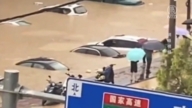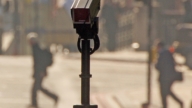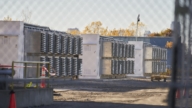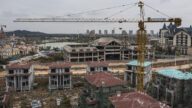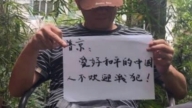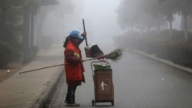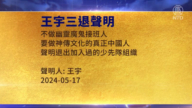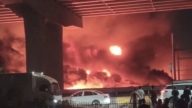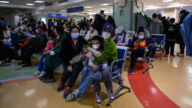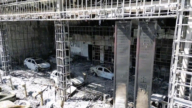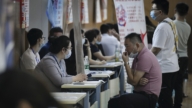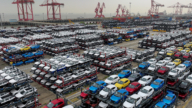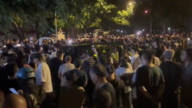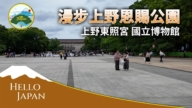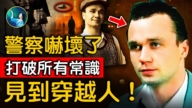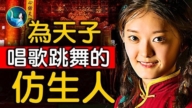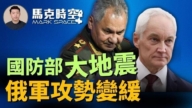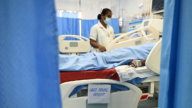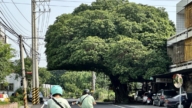【新唐人2011年9月29日讯】中国上海地铁10号线发生严重追撞事故,造成至少271人轻重伤,当局初步判定,肇事原因是讯号系统故障,这起事故可说是723甬温事故的翻版。上海地铁追尾,再次引发中国铁路安全的忧虑。
9月27号下午2点51分,上海地铁10号线信号设备发生故障,豫园往老西门方向的区间隧道内5号车追尾16号车,造成271人受伤,所幸无人员死亡。
根据运营方公开的信息,事故发生在信号系统故障后采用人工调度,手动开车,正常操作下应该可以保证安全,却还是发生事故,连专家都表示,无法理解。
詹工程师:“如果人工调度系统可靠的话,可行的话,世界这么多国家地铁,不需要上ITP系统,也不要用自动调拨,现在就是说自动系统不行了,我们就改人工系统,这个决策本身也是有问题。那个事故(温州动车事故)调查也没有出来,而且好像一开始说了是信号问题,后来又说不是,所以还在遮遮掩掩,这块又出了问题了,实际上就是拿人的生命来作实验了。”
近年中国在铁道部和几家国有公司推动下,以创记录的速度扩建了铁路和城市轨道交通网络。上海地铁10号线的信号供应商为卡斯柯,也是温州动车事故和两年前撞车的1号线供应商,在建专案包括上海轨道交通10号线信号系统、广州地铁6号线信号系统、深圳地铁5号线等。
上海居民施小姐:“不只是一次啊,只不过当时,比如说在3月份、4月份、5月份时候,他说系统问题,(地铁车辆)会突然间停,停个4~5分钟再开,上面写是因为信号故障问题,其实就是同样一个问题发生。之前其实就可以避免的,之前就可以有效进行反复的实验、勘测,或者怎么样去可以做到控制的。”
公开资料显示,卡斯柯是央企“通号集团”旗下子公司,“通号集团”原隶属铁道部,2000年与铁道部脱钩后划入国资委管辖,旗下还有通号院等十几家公司。铁道部、通号集团以及一系列涉及高铁产业的公司之间有着千丝万缕的联系。
前大陆地铁工程师詹先生:“在中国大陆来讲,现在每一公里地铁造价都是几亿元人民币,比如说地铁车辆的采购,采购国外的零部件,会吃回扣,从国内工程的分包,会吃回扣,谁给的回扣大,谁就能拿到工程,层层转包,所以每一层都会扒一层皮。这个钱也是钜额的。进口采购,回扣更是钜额的。拿到这个合同,谁也不知道这个合同到底是多少钱?可能有百分之多少的回扣,可能就进了个人腰包了。”
据大陆媒体报导,铁道部副总工程师张曙光,在美国和瑞士的银行坐拥28亿美元存款,很多钱都是外国供应商“上供”的。
大陆工程管理工程师洪先生:“因为我们这都是政府投资工程,但在中国的话又是长官意识比较强烈,所以说很多制度都只能流于形式,无法用完善的制度来减少事故的发生。”
《大纪元新闻网》评论作者王华表示:“这些年中国经济上来了,不过从一连串的铁道事故中可以看出,在中国对人的培训、管理是不被重视的,这也说明了问题关键还是在人,才会出现豆腐渣信号设备、人工作业疏失,人为的因素导致了各层原因的出现。”
新唐人记者梁欣、李庭、黎安安采访报导。
Subway Collision Due To Management Issues?
China’s Shanghai Metro Line 10 encountered
a serious accident, injuring at least 271 people.
The reason is claimed to be signal system failure.
The accident is similar to the 7/23 train accident in Wenzhou.
The Shanghai Metro rear-end collision once again
raised concerns over China’s railway safety.
At 2:51 P.M. on September 27, Shanghai Metro Line 10
encountered signal equipment failure,
Car 5 crashed into the rear end of Car 16
in the tunnel from Yuyuan to Old Ximen.
During the crash were injured 271 people,
but fortunately there were no casualties.
According to public information, the accident occurred after
a signal system failure due to manual scheduling and starting.
Under normal operation, it should be able to guarantee safety,
but the accident still occurred. Experts can’t understand why.
Zhan (Engineer): “If the manual scheduling system is reliable
and feasible, there is no need of the ITP system,
or automated scheduling. They switched to manual
scheduling after failure of the automated system.
The decision itself is problematic. Reports are yet to be
released on that accident (Wenzhou train crash).
It was said to be signal problem at the beginning,
but later on, this was denied.
They try to be secretive. Now it has problems again.
They are experimenting with human lifes."
In recent years, driven by China’s Ministry of Railways and
several state-owned companies, China expanded its railway
and urban rail transport network at a record speed.
The signal system provider of Shanghai Metro Line 10
is CASCO, the same in the Wenzhou train crash and Line 1
crash two years ago. Their signal system under construction
included Shanghai Metro Line 10, Guangzhou Metro Line 6,
and Shenzhen Metro Line 5.
Miss Shi (Shanghai resident): “This is not just one-off case.
In March, April, May it was said to have system problems,
subway cars will suddenly stop,
standing there for 4 to 5 minutes.
It was written to be signal failure, but the same problem
occurs. This should’ve been avoided.
If beforehand they effectively carried out repeated trials
and investigations to get it under control."
According to public information, CASCO is a subsidiary
to the central enterprise Tonghao Group,
which is under the umbrella of the Ministry of Railways.
In 2000, Tonghao Group was assigned
to State Assets Administration Committee,
which also controlled more than a dozen companies
including Tonghao Institute. Ministry of Railways
and Tonghao Group are inextricably linked
to a number of groups and companies
in the high-speed rail industry.
Zhan (Engineer): “In mainland China, it costs several hundred
million RMB per kilometer of subway.
Subway cars and foreign parts procurement will have kickbacks,
domestic sub-projects have kickbacks too.
The one who offering the highest kickbacks will obtain the tender.
There are kickbacks between layers of subcontractors.
The amount is huge. Import procurement rebate is huge too.
Since this contract was put out, nobody knows how much
it is for, or what percentage of the kickback there might be.
The kickback may go into the wallet of individuals."
According to mainland China media, Zhang Shuguang,
Deputy Chief Engineer of the Ministry of Railways,
had $2.8 billion deposited in banks in the United States and
Switzerland. Most of the money was from foreign suppliers.
Mr. Hong (Engineering Management):
“We are all government-funded projects.
In China the power concept is strong, many systems can only
be a mere formality, there are no good system to reduce accidents."
Wang Hua (News Network commentator, Epoch Times):
“In recent years China’s economy went up,
But from a series of railway accidents, we can see the training
and management are not taken seriously in China.
The key issue is still the human factor, so there will still be
shoddy signal equipment, and negligent operations.
Human factors led to layers of causes (of the accidents)."
NTD reporters Liang Xin, Li Ting and Li Anan.


